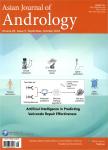PPARγ2 functions as a tumor suppressor in a translational mouse model of human prostate cancer
PPAR2 在人的前列腺癌症的一个翻译老鼠模型作为肿瘤 suppressor 工作作者机构:Laboratory of Nuclear Receptors and Cancer ResearchDepartment of PathologyMedical SchoolNantong UniversityNantong 226001China
出 版 物:《Asian Journal of Andrology》 (亚洲男性学杂志(英文版))
年 卷 期:2022年第24卷第1期
页 面:90-96页
核心收录:
学科分类:1002[医学-临床医学] 100214[医学-肿瘤学] 10[医学]
基 金:The work was supported by the National Natural Science Foundation of China(NSFC No.81874171 and 81703259)
主 题:inflammatory reaction necrosis PPARγ prostate cancer tissue recombination-xenografting
摘 要:Peroxisome proliferator-activated receptorsγ(PPARγ)is a master regulator that controls energy metabolism and cell ***γ2,a PPARγisoform,is highly expressed in the normal prostate but expressed at lower levels in prostate cancer *** the present study,PC3 and LNCaP cells were used to examine the benefits of restoring PPARγ2 ***γ2 was overexpressed in PC3 and LNCaP cells,and cell proliferation and migration were *** and eosin(H&E)staining was used to detect pathological *** genes regulated by PPARγ2 overexpression were detected by microarray *** restoration of PPARγ2 in PC3 and LNCaP cells inhibited cell proliferation and ***3-PPARγ2 tissue recombinants showed necrosis in cancerous regions and leukocyte infiltration in the surrounding stroma by H&E *** found higher mixed lineage kinase domain-like(MLKL)and lower microtubule-associated protein 1 light chain 3(LC3)expression in cancer tissues compared to controls by immunohistochemistry(IHC)*** analysis showed that PPARγ2 gain of function in PC3 cells resulted in the reprogramming of lipid-and energy metabolism-associated signaling *** data indicate that PPARγ2 exerts a crucial tumor-suppressive effect by triggering necrosis and an inflammatory reaction in human prostate cancer.



